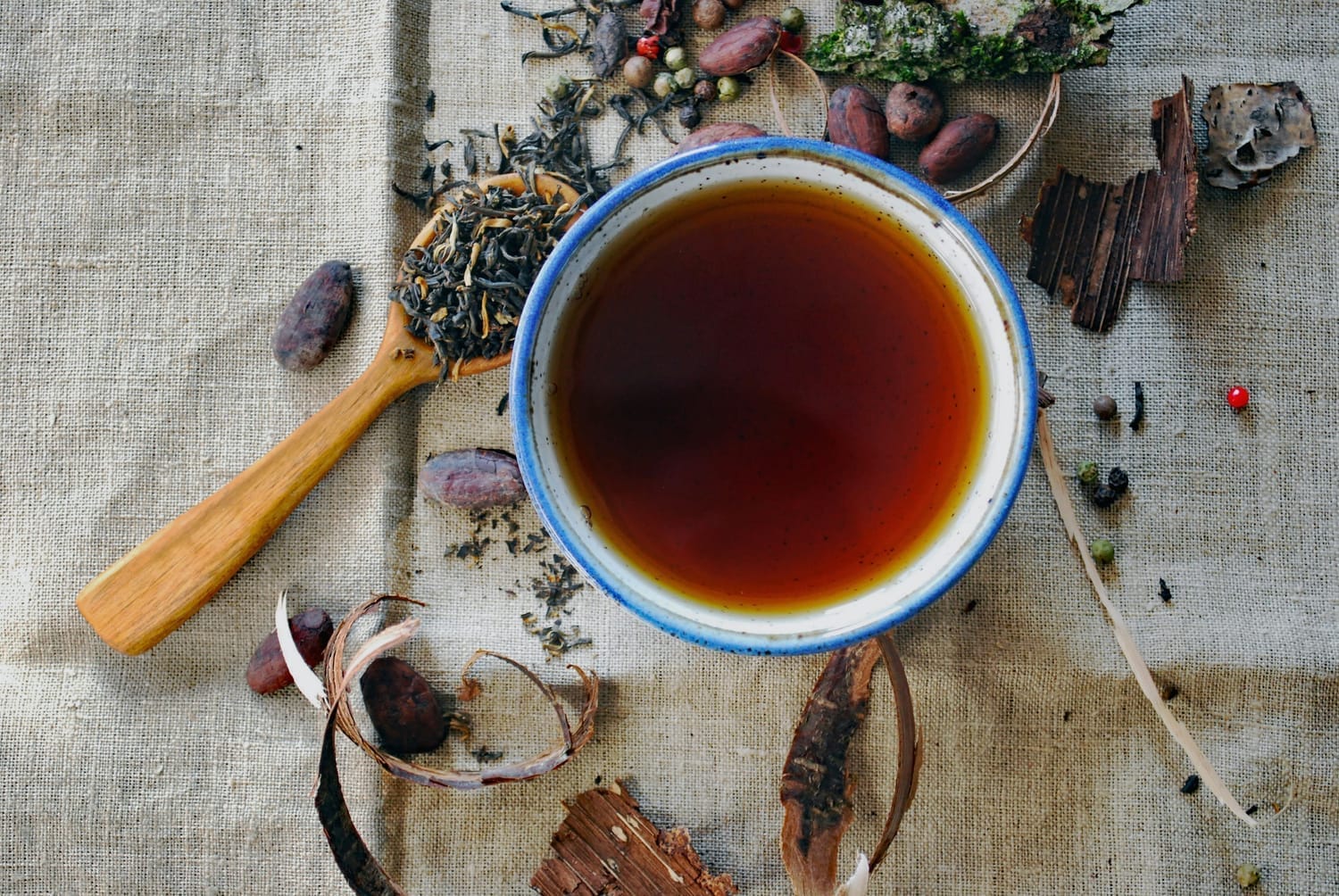
Are Herbal Teas Caffeine-Free? A Practical Guide (Plus Best Caffeine-Free Teas And Decaf Teas to Buy)
Introduction
Most herbal teas (tisanes) are naturally caffeine-free because they’re not made from the Camellia sinensis tea plant. However, there are exceptions, such as Pu-erh Tea, yerba mate, guayusa, kola nut, Decaf Teas such as White Tea, green Tea, Oolong Tea, Black Tea or blends that mix herbal ingredients with real tea leaves.
If you’re trying to cut back on caffeine, sleep better at night, or choose a safe beverage during pregnancy, you’ve probably wondered: Are herbal teas caffeine-free?
The short answer: usually yes — but not always. While most herbal teas are naturally free of caffeine, some plants do contain it naturally, and certain blends mix herbs with caffeinated tea leaves.
In this guide, we’ll break down:
HiWhat counts as an herbal tea
Which herbs contain caffeine
How to check your tea's caffeine content
How to choose the best caffeine-free and caffeinated tea for your need
Our top product recommendations
What is Herbal Tea Vs True Tea ?
To understand caffeine in tea, it’s important to know the difference between herbal tea and true tea.
True teas — black, green, white, oolong, and pu-erh — all come from the Camellia sinensis plant. This plant naturally contains caffeine, even in decaf versions (though decaf has less caffeine).
Herbal teas (also called tisanes) — are made from herbs, flowers, roots, spices, or fruits. Because they aren’t made from Camellia sinensis, most are naturally caffeine-free.
However, there are a few caffeinated plants used in herbal infusions, which leads us to the next section.
Caffeine-Free Vs Caffeinated/Decaf Herbal Tea
Naturally Caffeine-Free Herbal Teas:
Wilberforce Herbal Tea - Perfect for regulation of body system.
Chamomile - Mild floral flower, Perfect for relaxation and sleep.
peppermint - Cooling, refreshing, aids digestion.
Rooibos - Sweat, nutty, high in antioxidant.
Hibiscus - Tart, fruity, great iced.
Caffeinated/Decaf Herbal Teas:
Yerba Mate – South American herb with a coffee-like caffeine boost.
Guayusa – Amazonian leaf, high in caffeine.
Kola Nut – West African plant with natural caffeine.
White Tea: Known for gentle, low caffeine; typically around 15–30 mg per cup.
Green Tea: Moderate caffeine; usually 35–45 mg per 8 oz serving.
Black Tea: Higher caffeine than green; generally 40–70 mg per 8 oz.
Oolong Tea: Falls between green and black; about 37–55 mg per 8 oz.
Pu-erh Tea: Medium to high caffeine; a cup may contain 30–100 mg, with ripe (shou) at 60–70 mg, raw (sheng) at 30–45 mg.
Jasmine Tea: It's similarly contains green tea’s moderate caffeine.
Moonlight White (Chinese White Tea): As a white tea, it also naturally contains low caffeine, likely within the 15–30 mg range.

Important: Some “herbal” blends mix herbs with black or green tea. Always check the ingredients list if you want a true caffeine-free cup.
How to Tell if a Tea Has Caffeine
Check the ingredients list – Look for Camellia sinensis, “black tea,” “green tea,” or caffeinated herbs like mate or guayusa.
Look for caffeine claims – Packaging often states “naturally caffeine-free” or “contains caffeine.”
Check the nutrition label – Some brands list milligrams of caffeine per serving.
Search the product’s official page – Most reputable tea sellers provide caffeine content info online.
Why Caffeine Content Matters
Sleep – Caffeine can delay sleep onset and reduce sleep quality.
Pregnancy – Doctors recommend limiting caffeine intake to 200 mg/day or less.
Sensitivity – Some people experience anxiety, heart palpitations, or jitteriness even at low doses.
For bedtime, herbal teas like chamomile, rooibos, and peppermint are your safest bet.
How to Choose the Right Herbal Tea
Checklist:
✅ Caffeine-free label or verified ingredient list
✅ Loose-leaf or high-quality tea bags
✅ Organic or pesticide-free if possible
✅ Freshness (harvest date or recent packaging)
✅ Flavor profile that suits your taste (floral, minty, fruity, earthy)
Best Caffeine-Free And Decaf Herbal Teas to Buy
Here’s our curated list of herbal teas you can enjoy anytime with or without caffeine concerns.
| Tea Name | Caffeine Content | Form | Flavor | Best For | Price Range | Buy |
|---|---|---|---|---|---|---|
| Wilberforce Herbal Tea | None | Bag | Clean refreshing, floral/ fruity | Regulate whole body systems | $5-$7 | Buy Now |
| Chamomile Tea | None | Bags | Floral and mild | Sleep & Relaxation | $20-$22 | Buy Now |
| Peppermint Tea | None | Loose Leaf | Minty fresh | Digestion & Refreshment | $16-$17 | Buy Now |
| Rooibos Tea | None | Bags | Sweet and nutty | All-day sipping | $2-$3 | Buy Now |
| Hibiscus Tea | None | Loose Leaf | Tart and fruity | Cold brew & Iced tea | $5-$6 | Buy Now |
| Yerba Mate | High | Loose Leaf | Earthy and grassy | Energy boost | $16-$18 | Buy Now |
| White Tea | 6–35mg Per 8 oz (low) | Loose Leaf | Clean refreshing, floral/ fruity | Delicate sipping,Relaxation | $35 - $44 | Buy Now |
| Pu-erh Tea | 30–70mg Per 8 oz (low) | Loose Leaf | Earthy Millow to bitter and Sweat | Anti-Aging Tea, digestive aid, weight loss | $35-$45 | Buy Now |
| Green Tea | 35–45mg Per 8 oz (low) | Loose Leaf | Lighter,Grassier,smoother than black tea | Daily gently energy, health boost | $35-$60 | Buy Now |
| Oolong Tea | 35–55mg Per 8 oz (low) | Loose Leaf | Woody, floral/ wide | Mindful sipping, smooth tea | $35-$45 | Buy Now |
| Black Tea | 40–70mg Per 8 oz (low) | Loose Leaf | Bold, Strong, rebust | Morning boost, strong-flavor lovers | $35-$45 | Buy Now |
Brewing Tips
Chamomile – 5–7 minutes, boiling water.
Rooibos – 5–10 minutes, boiling water; great for iced tea too.
Peppermint – 5–7 minutes, boiling water.
Longer steeping does not create caffeine in herbal teas — caffeine can only come from the plant itself.
Final Thoughts
Herbal teas are a safe, delicious, and versatile choice for anyone avoiding caffeine — as long as you watch out for the few herbs and blends that naturally contain it. With the right picks, you can sip all day and even before bed without worrying about sleepless nights.
Shop now for your perfect caffeine-free tea
For Caffeinated/Decaf Tea products, click the link below 👇
Use promo code: Selfrise360 for 10% discount of all your orders
Frequently Asked Questions ( FAQs)
1. Are all herbal teas caffeine-free?
No. While most herbal teas like Wilberforce herbal tea, chamomile, rooibos, hibiscus, and peppermint are naturally caffeine-free, some such as yerba mate, guayusa, kola nut, and yaupon naturally contain caffeine.
2. Which herbal teas are completely caffeine-free?
Caffeine-free herbal teas include Wilberforce Herbal tea, chamomile, peppermint, rooibos, hibiscus, lemon balm, and lavender. These are safe for people avoiding caffeine.
3. Which herbal teas contain caffeine?
Yerba mate, guayusa, white tea, green tea, black tea, Pu-erh tea, kola nut, and yaupon are herbal teas that naturally contain caffeine, providing a natural energy boost.
4. Is herbal tea better than coffee for reducing caffeine?
Yes. Herbal teas that are naturally caffeine-free are a healthier alternative to coffee if you want to reduce caffeine intake without losing the ritual of a warm drink.
5. Can I drink herbal tea before bed?
Yes, herbal teas like Wilberforce herbal tea, chamomile, lemon balm, and lavender are naturally caffeine-free and are well-known for promoting relaxation and better sleep.
6. Are caffeine-free herbal teas safe during pregnancy?
Most caffeine-free herbal teas such as Wilberforce herbal tea, ginger, rooibos, peppermint, and chamomile are generally safe during pregnancy, but it is important to consult your doctor before regular use.
7. Does decaf tea mean the same as caffeine-free herbal tea?
No. Decaf tea refers to traditional tea (like black or green tea) with most caffeine removed, while herbal teas are made from herbs, flowers, or fruits and are naturally caffeine-free.
8. Can herbal teas help with energy if they are caffeine-free?
Yes, some caffeine-free herbal teas like Wilberforce herbal tea, ginseng and ginger can boost energy and alertness naturally, without the crash associated with caffeine.
9. What is the healthiest caffeine-free herbal tea?
Some of the healthiest caffeine-free herbal teas include wilberforce herbal tea ( rich with antioxidant), rooibos (rich in antioxidants), chamomile (great for relaxation), and hibiscus (supports heart health).
10. Can children drink caffeine-free herbal tea?
Yes, most caffeine-free herbal teas like wilberforce herbal tea, chamomile, rooibos, and peppermint are safe for children in moderation, but always consult a pediatrician first.
11. Can herbal tea help reduce anxiety and stress?
Yes. Herbal teas such as wilberforce herbal tea, chamomile, lemon balm, and lavender are known for their calming effects and can help reduce stress and mild anxiety naturally.
12. How many cups of caffeine-free herbal tea can I drink daily?
Most people can safely enjoy 2–4 cups of caffeine-free herbal tea daily, but it’s best to vary types of herbs and consult your doctor if you have health conditions.
Author:
Dr. Kingdom Ukpong
Dr. Kingdom Ukpong is a seasoned public health practitioner with a strong passion for leveraging digital lifestyles to improve health and well-being. He is the CEO and Founder of PUGA TRINICARE and SelfRise360, innovative platforms dedicated to advancing holistic healthcare solutions and personal development. Through his leadership, Dr. Ukpong continues to champion transformative approaches that integrate technology, health, and lifestyle for sustainable impact.
Related Articles:
ABOUT
Lorem Ipsum is simply dummy text of the printing and typesetting industry. Lorem Ipsum has been the industry's.
Created with ©systeme.io




